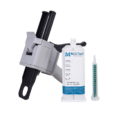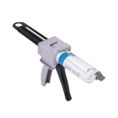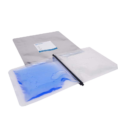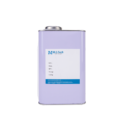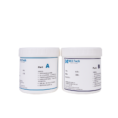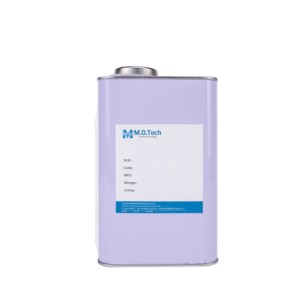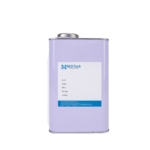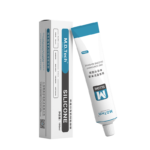MDACR 2342F UV Conformal Coatings
- Modified polyurethane acrylate
- UV moisture dual curing
- Low viscosity, suitable for brush, spray, dip coating a variety of processes
- After curing, a transparent elastic protective film with certain hardness and wear resistance is formed
- Good adhesion to various circuit boards
- Good high and low temperature resistance and flame retardant performance
- MDACR 2342F UV Conformal Coatings adhesive is a single component low viscosity UV Conformal Coatings.
- This product is UV wet double curing system, the shadow part of UV light can be wet curing. 100% solid, no solvent. Green and eco-friendly.
- The product has the advantages of low viscosity, can be sprayed, suitable for water curtain spraying process operation, UV curing surface fast viscosity, wet resistance, salt spray resistance, dust resistance, easy to use, safe operation and so on.
Technical parameters before and after curing:
| Model | MDACR 2342F |
| Color | Fluorescent blue clear liquid |
| Features | PU Modify Acrylic |
| Curing method | UV or moisture |
| Viscosity (mPas) | 180-200 |
| Density (g/cm3) | 1.05-1.10 |
| Solid content (%) | 100 |
| Warranty period (months) | 6 |
| Moisture full hardening time, h (25℃ 70%RH) | 72 |
| Hardness(Shore D)400mW/cm2,20s | 50-60 |
Curing condition
| Recommended curing conditions | 365nm UV-LED
Surface light source |
405nm UV-LED Surface light source | 0.2 KW
Track type mercury lamp |
| Light source optical power ( mW/cm²) | 700 | 700 | 0.2 KW |
| Curing time (s) | ≥5 | ≥6 | ≥6 |
| Accumulated energy(mj/cm²) | ≥3500 | ≥4200 | ≥1200 |
| Curing instructions: The curing speed varies with the intensity of the UV lamp, the distance from the light source, the spectral distribution of the light source, the exposure time, and the light transmittance of the substrate. | |||
| Electrical/mechanical properties (curing at 25℃ and 75% humidity for 7 days) | ||
| Hardness (Shore D) | 65-70 | |
| Applicable temperature range (℃) | -50~+135 | |
| Dielectric strength (kv/mm) IPC-TM-650 | ≥16 | |
| Dielectric constant (70MHz) | 2.9 | |
| Volume resistivity (Ohm·cm) IPC-TM-650 | ≥7.99×1013 | |
| The following data are performance tested after 7 days at room temperature | ||
| Adhesion | Hundredfold method | 5B |
| Moisture-proof insulation properties | IPC-CC-830B | Pass |
| Electromigration | IPC-SM-840C | / |
| Electrical corrosion | IPC-CC-830B | / |
| High and low temperature shock | – 45-125 ℃ | Pass |
| Hydrolytic stability | IPC-CC-830B | Pass |
| Salt spray test | 5% NaCl solution /pH 6.5-7.2/35℃ | Pass |
| Antifungal test | ASTM G21 | Pass |
| Flame retardant test | UL94-V0 coating substrate test | Pass |
All the above data were obtained by determination or further experimental test after 7 days of adhesive curing at 25℃, 55%RH.
- Hybrid integrated circuit
- Automotive electronic control panel
- Electronic circuit board
- Aeronautical instrument
- Soft printed circuit board
- Computer control panel
- Industrial control panel
- Semiconductor crystal line protection
- Home appliance controller
- Outdoor LED display
Instructions
- The exposure of ambient and artificial light sources should be minimized before curing.
- The coating site must be cleared of flux residue, grease, release agent or other contaminants before sizing.
- The curing speed depends on a number of factors, including UV lamp strength, the distance of the coating from the light source, the thickness of the coating and the amount of glue in the shaded area.
- Appropriate UV lamps must be used for curing; For the opaque shadow area, the curing effect can be achieved by moisture reaction, but the final performance of the product cannot be achieved by moisture curing alone. Actual moisture curing times may vary depending on the application. Under normal humidity conditions, the shaded area can be cured with moisture within 7 days.
- The product is suitable for a variety of manual and automatic spraying equipment. The source air used for spraying must be dried (dry inert gas is strongly recommended) to prevent premature moisture curing of the product. Spraying process under good ventilation. Sheet size, geometry, and coating method affect the final coating thickness.
- This product is a wet curing material, and the containers and pipes in the process should be protected from moisture as much as possible.
Related products
MDCOAT 7007 80 Shore A Silicone conformal coating
Color: Transparent
MDCOAT 7060 fluorescent indicator silicone conformal coating
Color: Transparent
MDCOAT 7067 Low viscosity Silicone conformal coating
Color: Transparent
MDSI 7001 clear one component Silicone adhesive
Color: Clear







